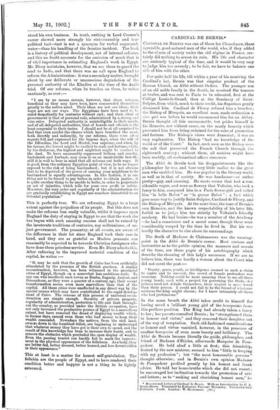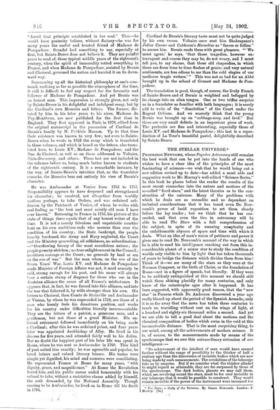CARDINAL DE BERNIS.* CARDINAL DE BERNIE was one of those
lax Churchmen, those agreeable, good-natured men of the world, who, if they added to the charm of society under the old regime in France, cer- tainly did nothing to arrest its ruin. His life and character are curiously typical of the time, and it would be very easy to judge him too severely ; to be fair, we have to balance one side of him with the other.
For quite half his life, till within a year of his receiving the Cardinal's hat, Bernie was that singular product of the Roman Church, an Abbe without Orders. The younger son of an old noble family in the South, be received the tonsure at twelve, and was sent to Paris to be educated, first at the CollCge Louis-le-Grand, then at the Seminary of Saint- Sulpice, from which, much to their credit, his Superiors gently dismissed him. Cardinal de Fleury refused him a benefice ; the Bishop of Mirepoix, an excellent man, made ordination a sine qtui non before he would recommend him for an Abbey.
Bernie thought all this unreasonable, but prides himself in. his Memoirs, not without cause, on the manly honesty which
prevented him from being ordained for the sake of promotion and fortune. The Bishop's views were Jansenist ; it was an easy explanation. The Bishop " had no knowledge of the world or of the Court." In fact, such men as the Bishop were the salt that preserved the French Church through the eighteenth century ; without them, all motives might have been worldly, all ecclesiastical offices sinecures.
The Abbe de Bemis took his disappointments like the philosopher he was, and bore very little malice to the great . men who snubbed him. He was popular in the literary world, as well as in that of society. He was handsome—or rather pretty—gay, and amusing. He wrote verses that had a con- siderable vogue, and were so flowery that Voltaire, who took a fancy to him, compared him to a Paris flower-girl and called him "la belle Babet" or "La grosse Babet" : a fact which goes some way to justify Saint-Sulpice, Cardinal de Fleury, and • the Bishop of Mirepoix. At the same time, the tone of Bemis's own Memoirs, and the known respectability of his later life, forbid us to judge him too strictly by Voltaire's friendly mockery. He had brains—he was a member of the Academy —he had a conscience and a moral sense, though these were considerably warped by the time ho lived in. But his was . hardly the character to rise above its surroundings.
The death of Madame de ChAteauroux was the turning- point in the Abbe de Bemis's career. Most curious and instructive as to the public opinion, the manners and morals of the time, are those pages of his autobiography which describe the choosing of this lady's successor. If we are to believe him, there was hardly a woman about the Court who did not covet the post :—
" Beauty, grace, youth, or intelligence seemed to each a claim to aspire and to succeed ; the crowd of female pretenders was immense. Nothing could be more amusing than to see all those young heads, each with a project for governing the State—for princes need not delude themselves, their sceptre is more loved than their person. I could not fail to be the friend of whatever mistress the king might choose; for I knew intimately all those who had pretensions."
In the same breath the Abbe takes credit to himself for having saved a brilliant young girl of the bourgeoisie from this perilous position. The King had already taken a fancy to her ; her parents consulted Bernie ; he "strengthened them-, in honour and virtue," and they removed their daughter out . of the way of temptation. Such old-fashioned considerations as honour and virtue vanished, however, in the presence of another bourgeoise of even more beauty and brilliancy. The-
Abbe de Berths became literally the guide, philosopher, and• friend of Madame d'Atioles, afterwards Marquise de Pom-
padour. He held aloof a little at first; this friendship,. desired by the new mistress, seemed to him "little in keeping, with my profession"; but "the most honourable persons" thought otherwise ; and in Bernis's own opinion Madame de Pompadour profited greatly by his honest and frank advice. He told her home-truths which she did not resent ; he encouraged her inclination towards the protection of arts and letters ; as to " seeking and cherishing honest men," he • Memoirs and Letters of Cardinal de Bernie. With an Introduction by C. A. Sainte-Deuve. Translated by Katharine Prescott Wormeley. Illustrated with Portraits. 2 vols. London : W. Heinemann. [42s.]
" found that principle established in her soul." Thus—he would have posterity believe, without flattery—he was for many years the useful and trusted friend of Madame de Pompadour. Scandal had something to say, especially at first, but Sainte-Beuve does not believe it. They are painful years to read of, those typical middle years of the eighteenth century, When the spirit of immorality rotted everything in France, and when Madame de Pompadour, assisted by Berths and Choiseul, governed the nation and hurried it on its down- ward way.
Summoning up all the historical philosophy at one's com- mand, realising as far as possible the atmosphere of the time, it still is difficult to feel any respect for the favourite and follower of Madame de Pompadour. And yet Bernis was an honest man. This impression is strongly given, not only by Sainte-Beuve in his delightful and indulgent essay, but by the Cardinal's own Memoirs and letters. The former, dic- tated by him in his later years to his niece, Madame du Puy-Montbrun, are now published for the first time in England. They first appeared in Paris in 1878, edited from the original manuscript in the possession of Cardinal de Bemis's family by M. Frederic Masson. lip to that time their existence was known to very few; not even to Sainte- Beuve when he wrote in 1853 the essay which is translated in these volumes, and which is based on the letters, also trans- lated here, to Louis XV., Madame de Pompadour, and the Due de Choiseul, as well as on those addressed to Voltaire, Paris-Duverney, and others. These last are not included in the volumes before us, being much better known to students of the eighteenth century. It is a remarkable instance, by the way, of Sainte-Beuve's intuition that, as the translator remarks, the Memoirs bear out entirely his view of Bemis's character.
He was Ambassador at Venice from 1752 to 1755. Responsibility appears to have deepened and strengthened his character ; he resolved, not altogether from worldly motives perhaps, to take Orders, and was ordained sub- deacon by the Patriarch of Venice, of whom he writes with real feeling as "the best and most saintly old man I have ever known." Returning to France in 1755, his picture of the state of things there equals that of any honest writer of the time. It is not a merely frivolous and unpatriotic courtier bent on his own ambitious ends who mourns thus over the condition of his country; the State bankrupt, the people heavily burdened, the Army and Navy neglected, the Court and the Ministry quarrelling, all selfishness, no subordination : —" Overflowing luxury of the moat scandalous nature ; the people poverty-stricken ; no true enlightenment in the Council ; no citizen courage at the Court; no generals by land or sea on the eve of war." But the man whom, on the eve of the Seven Years' War, Louis XV. and Madame de Pompadour made Minister of Foreign Affairs was not, it need scarcely be said, strong enough for his post, and his name will always hear a certain stamp of disgrace for those who see in the Austrian affiance the cause of all France's misfortunes, It appears that, in fact, he was forced into this alliance, and into the war that followed it, by wills stronger than his own. His letters to Choiseul, then Comte de Stainville and Ambassador at Vienna, by whom he was superseded in 1758, are those of a man who keenly feels his disastrous position, and works for his country under diffictllties literally insurmountable. They are the letters of a patriot, a generous man, and a gentleman, but not those of a great Minister. His en- forced retirement followed immediately on his being made a Cardinal ; after this he was ordained priest, and four years later was appointed Archbishop of Alby. He lived in his diocese for five years, and attended fairly well to his duties. But no doubt the happiest part of his later life was spent in Rome, where he was sent as Ambassador in 1769. This kind of post suited him exactly ; he was agreeable and popular, he loved letters and valued literary leisure. His tastes were simple yet dignified, his mind and manners were conciliating. He represented France at Rome for many years, " with dignity, grace, and magnificence." At Rome the Revolution found him, and his public career ended honourably with his refusal to take, without a restrictive clause added by himself, the oath demanded by the National Assembly. Though ceasing to be Ambassador, he lived on in Rome till his death
in 1794. .
Cardinal de Bemis's literary taste must not be quite judged by his own verses. Voltaire once sent him Shakespeare's lulius Caesar and Calderon's Heraclius as "farces or follies " to amuse him. Berths reads them with great pleasure. "' We must agree,' he says, 'that those tragedies, however ex- travagant and coarse they may be, do not weary, and I must tell you, to my shame, that these old rhapsodies, in which there are from time to time flashes of genius and very natural sentiments, are less odious to me than the cold elegies of our mediocre tragic writers.' " This was not so bad for an Abbe brought up in the school of Gresset and Madame de Pom- padour.
The translation is good, though, of course, the lively French of Sainte-Beuve and of Bemis is weighted and befogged by its change into an alien tongue. One or two trifles surprise us in a translator so familiar with both languages ; it is surely odd to write of the " dissolution " of the Court under the Regent Orleans. And we scarcely think that the young Bemis was brought up on "cabbage-soup and lard." But these are very small defects in an important piece of work. The portraits are fine and interesting, especially those of Louis XV. and Madame de Pompadour ; this last is a repro- duction of La Tour's beautiful pastel, delightfully described by Sainte-Beuve.











































 Previous page
Previous page